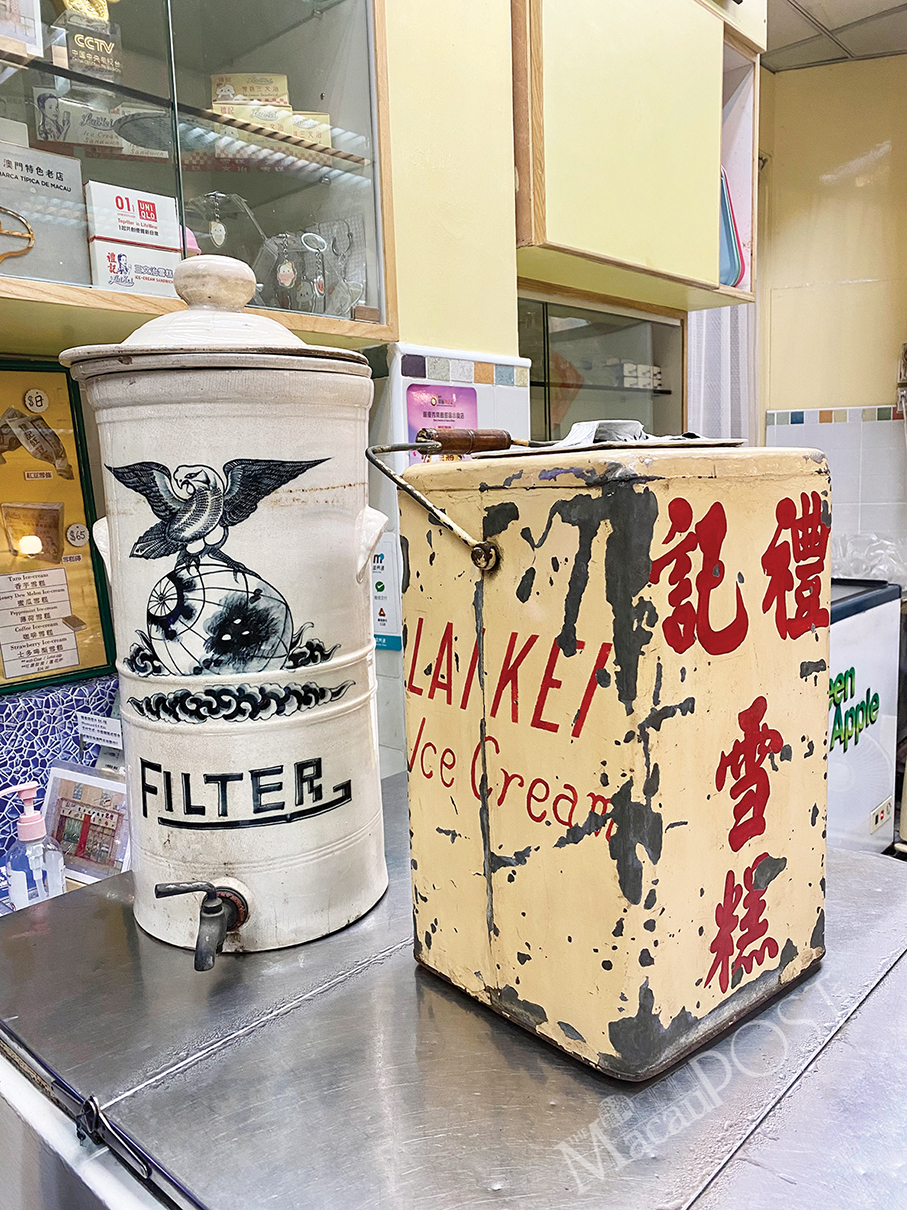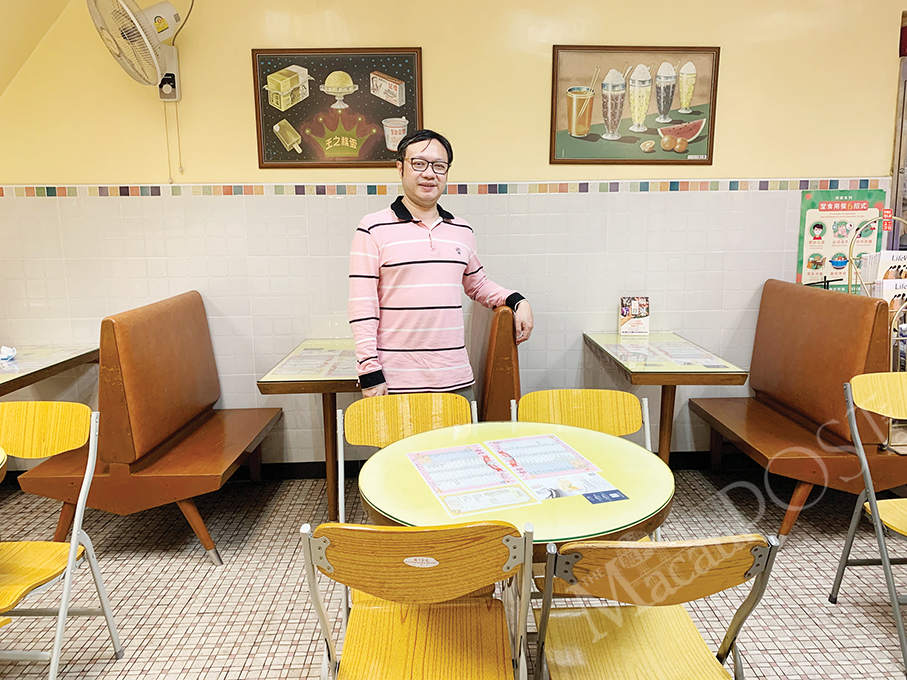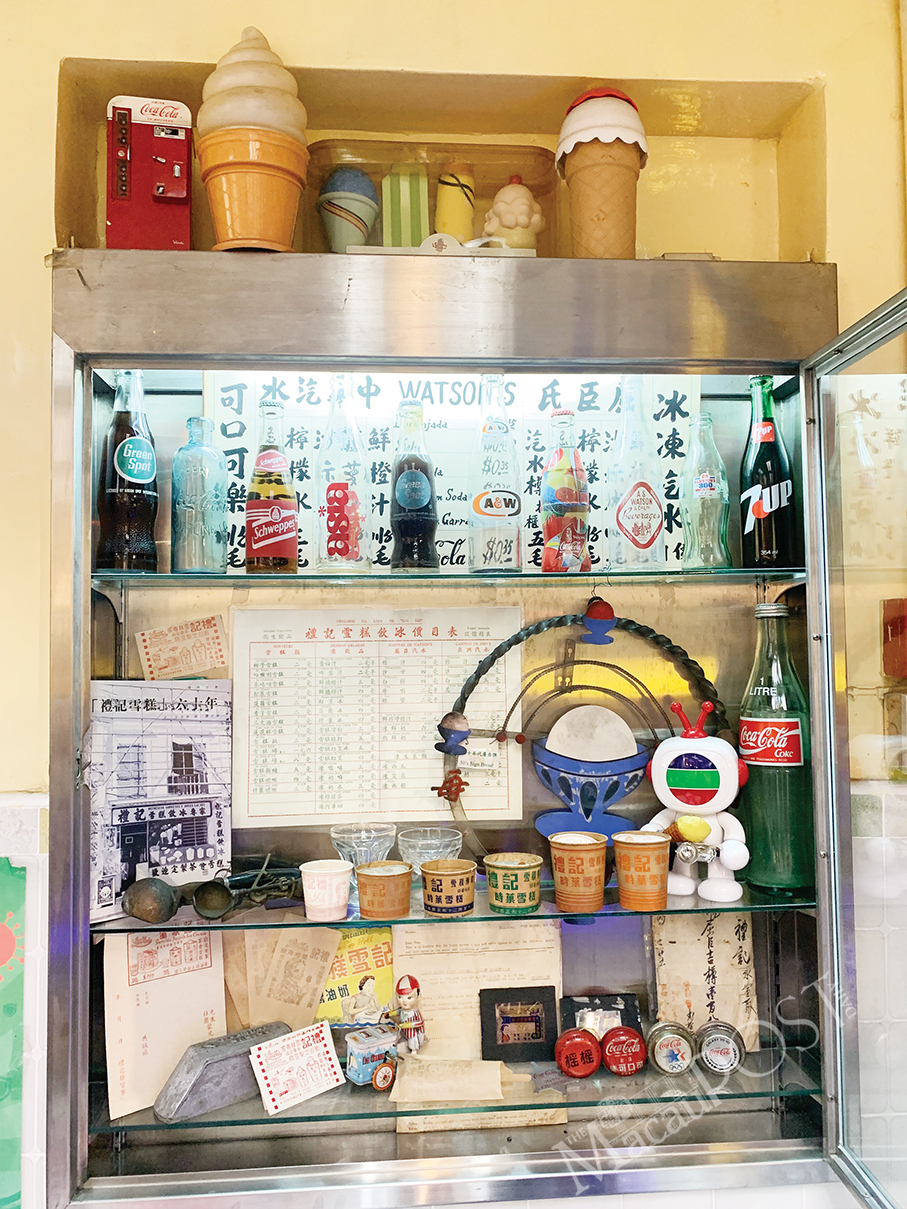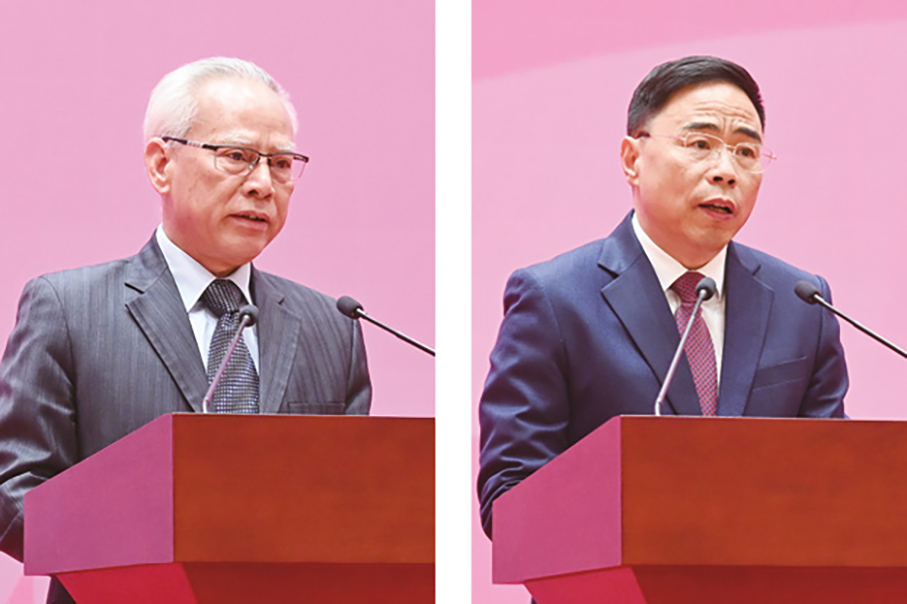Lai Kei ice cream parlour owner Ambert Kong Wing Tsan (鄺永燦) and cultural heritage researcher Cheang Kuok Heng (鄭國興) gave a talk at Lai Kei Sorvetes e Doces (禮記雪糕) in Ho Lan Un district on November 19 about the shop, with references to its vintage items such as posters, receipts of purchases, and ice cream making machines.
“Sorvetes e Doces” means “ice creams and sweets”.
The talk was part of a series entitled “Memory Salon” (記憶沙龍), co-hosted by the Macau Foundation (FM) and Macau Memory (澳門記憶).
3 generations
According to Kong, his grandfather Kong Lai Keng (鄺禮敬) founded the local ice cream brand Lai Kei in 1933, adding that his grandfather would carry heavy tin containers of ice cream to sell the sweet treat around the Nam Van district. Kong also said that his grandfather started selling ice cream there because it was a luxury dessert at that time, which was only popular among the rich and the foreigners. Kong also noted that Lai Kei opened its first shop in the 1940s which was opposite to where it is now when it moved to 12 Avenida do Conselheiro Ferreira de Almeida (荷蘭園大馬路) in the 1960s.
Lai Kei’s vintage ice cream container which Ambert’s grandfather used for selling ice cream in the Nam Van district in the 1930s. File photos suppled by Lai Kei Ice Cream
Lai Kei’s first physical shop in Avenida do Conselheiro Ferreira de Almeida in the 1940s.
Last month’s talk used the shop’s vintage objects to show how Lai Kei made their ice-cream in the past. One of them was a vintage water filter which was bought in 1941. Kong mentioned that Lai Kei emphasised its product had to be made with filtered water (熟水製造) at that time because of Macau’s then poor and unsanitised environment that could lead to health risks, and because ice-cream does not require cooking. Cheang underlined that there was a cholera outbreak in the 1940s which killed many people. As a result, Lai Kei ensured people could enjoy ice cream safely by filtering its water.
Cholera is a potentially fatal disease that can be transmitted through contaminated food or water.

Lai Kei’s vintage water filter (left) and ice cream container used in the first shop in the 1940s.
Other items shown were the shop’s posters. Cheang said that the posters were drawn and printed by advertising companies in the 1950s to 60s. Moreover, he pointed out, they were made using gouache (a thick watercolour paint) and advertising colours as the medium. Cheang pointed out that this was the reason the posters have been kept in good condition.
When asked by a member of the full-house audience why the logo for Lai Kei’s ice cream packages features a girl with two plaits, Kong responded that his grandfather had four sons and he so wanted a daughter. After having come up with the girl with two plaits as the logo, he had two daughters and, therefore, the shop’s logo has been kept ever since.
When asked by one of the members of the audience why Lai Kei had “Lai” in its name, Kong said that “Lai” came from his grandfather’s given name (禮).
Interview with Ambert Kong
Kong told The Macau Post Daily in a follow-up interview last Friday that he was born in Hong Kong but brought up in Macau. He graduated from California State University, Northridge (CSUN), in 2001, majoring in Graphic Design. He returned to Macau in 2002 and worked for a computer company and then a local hotel as graphic designer for about 2 ½ years.

Shop owner Ambert Kong Wing Tsan poses after last Friday’s interview in front of the shop’s vintage booths and tables from the 1960s with two posters from the 1940s on the wall. Photos: Ula Cheang
Kong said that the shop was run by his parents at that time. He pointed out that he thought of closing down the business after discussing the matter with his parents. It was because the business was not as good as before as there were lots of new competitors such as cafés, eateries and restaurants in Macau which gave the locals, particularly the younger ones, many choices. However, after a number of casino hotels started their business in Macau in the new millennium, the local government promoted the shop as one of the very few shops as a time-honoured brand shop (老字號) in Macau. One of the unique aspects of the shop is that it has kept its booths and tables since it opened in the 1960s as well as the shop’s layout and ice cream packaging. Many tourists then began to visit the shop to experience its “nostalgic atmosphere and taste”.
Kong also underlined that many regular customers begged him not to close the business because their parents only like to savour Lai Kei ice cream. Some regulars told him that they liked to tell their life stories when taking their overseas friends to the shop, telling them that this was where they often went during their childhood. Other customers also took their children and even grandchildren to the shop telling them their childhood stories. Kong said he was touched by these “valued customers” who really love their parents and the place where they were brought up. It is a “love complex” which is why he has continued the business until now even though the earnings are not that profitable, he pointed out.
Kong said that he has been giving some talks and interviews to share and promote the shop’s unique branding and its story. He underlined that he appreciates the young generation’s – particularly mainland students’ – positive attitude and initiative, their drive and proactive approach towards learning.
Kong also collaborated with various companies and corporates such as Lady M Confections Co. Ltd., The Coca-Cola Company, MGM, Wynn, UNIQLO Co. Ltd. and Circle K convenience store to jointly promote their products and branding. Kong pointed out that his plan is to do his best and to continue to run the business as long as he can in showing one of Macau’s unique nostalgic brandings in the Greater Bay Area (GBA).
The GBA consists of nine cities in Guangdong province and the nation’s two special administrative regions – Hong Kong and Macau.

Vintage items shown in the shop’s display window such as ice cream cups, soft drinks and ice cream scoops.
Macau Memory
“Macau Memory” is a large-scale cultural conservation project carried out by the Macau Foundation. It collects and sorts out various historical and cultural materials scattered around Macau from ancient times to the present. The project aims to integrate, digitise the information, and preserve it, according to a statement from the Macau Memory website.
For enquiries, call 8797 8500 or visit www.macaumemory.mo.








